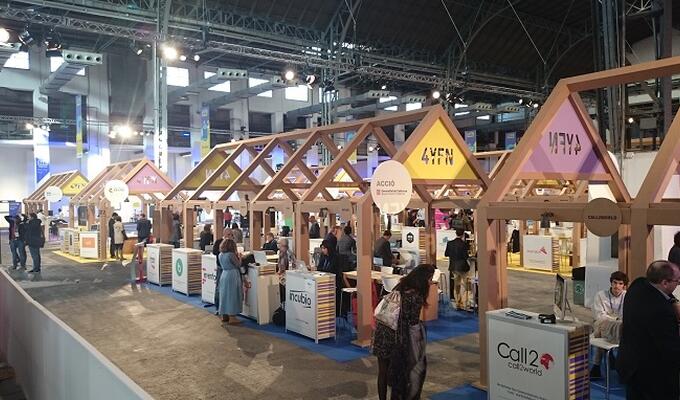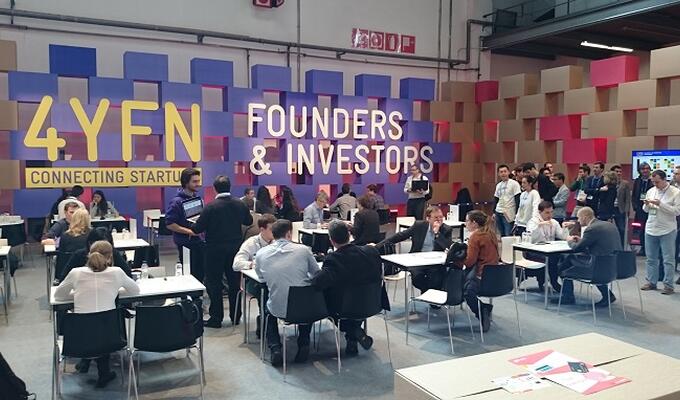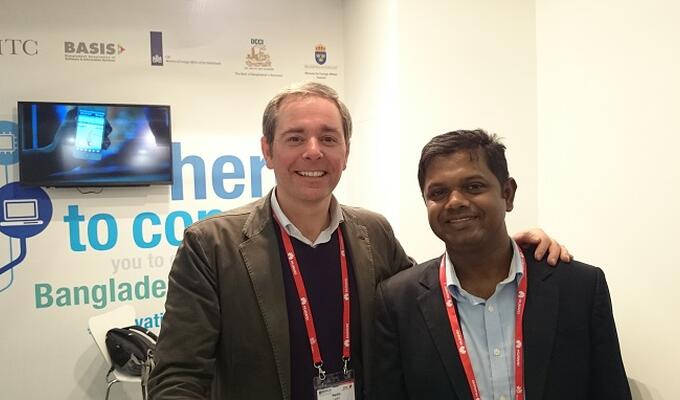


Big opportunities for small tech firms from LDCs at Mobile World Congress
Some of the world’s biggest technology companies – Samsung, Sony, LG and Huawei – unveiled new products at the annual GSMA Mobile World Congress in Barcelona last month. The global mobile device industry’s biggest names, from Facebook founder Mark Zuckerberg to Intel Chief Executive Officer Brian Krzanich, were keynote speakers at the four-day conference that began on 22 February.
But the world’s largest mobile tech fair isn’t all about ‘big’: many of the nearly 2200 companies showcasing new technologies and innovative products were small and medium-sized enterprises (SMEs). These included a delegation of businesses from Bangladesh and Uganda that are beneficiaries of the International Trade Centre’s Netherlands Trust Fund III programme, which seeks to help technology companies in the two countries, as well as Kenya, reach new clients in foreign markets. Amidst country pavilions dominated by developed and emerging economies, theirs was the fair’s only stand from least developed countries (LDCs), made possible by support from the Swedish Ministry for Foreign Affairs.
The Netherlands Trust Fund programme, now in its third phase of projects to foster export competitiveness in key growth sectors in beneficiary countries, is funded by CBI, the Netherlands government's Centre for the Promotion of Imports from developing countries.
The four companies from Bangladesh – Brain Station-23, DataSoft Systems Bangladesh, Nascenia and Structured Data Systems – and two from Uganda – ClinicMaster International and Laboremus Uganda – were hoping the Mobile World Congress would help them expand their networks and boost their potential to add customers. And the trade fair came through.
‘MWC went very well for us,’ said Timothy Musoke, head of consulting and technology at Kampala-based Laboremus. ‘We met prospective clients who are willing to start business with us, [and] the kind of prospective clients we met tended to want us to make for them software systems they wanted to use in the East African region.’
These businesses are eager to enter the East African market, and need local partners to help them customize their products for consumers in the region, Musoke said. ‘We see a lot of potential in targeting international partners, especially Europe,’ he said.
The congress also proved valuable for BrainStation-23, said Raisul Kabir, chief executive of the Dhaka-based software company. ‘We met with 32 companies, out of which there are three hot leads, eight total leads and the rest are prospects,’ he said. ‘Overall, our impression is positive, because there were a number of companies who were exhibitors who could be our potential clients.’
Kabir was particularly enthusiastic about the “Four Years From Now” (4YFN) gathering, an international business and networking platform within the congress for the global tech startup community. The highlight of the 4YFN event was a programme led by global experts in entrepreneurship and innovation that featured workshops, interactive discussions, pre-arranged one-on-one investor meetings and startup competitions, such as the finals of the Global Mobile Innovators Tournament. Raisul said he is optimistic that some of the contacts he made during the three-day 4YFN programme will lead to new contracts for BrainStation-23, whose clients are mainly SMEs in the Netherlands, Denmark, the United Kingdom, Canada and the United States.
Mobile World Congress has already produced new business for Structured Data Systems, which has more than 19 years of experience in software engineering and research services for international clients. One of the companies that Managing Director Reffat Zaman met in Barcelona has hired Structured Data for a trial project, he said, and ‘based on our budget, schedule and price, they may give us a contract’.
Wilson Kutegeka of ClinicMaster praised the congress as a way for his company to make new contacts that eventually turn into new business. ClinicMaster is a systems integration and software development company that provides integrated health information management and medical billing software to automate patients’ transactions in the hospital on a daily basis.
’Exhibiting at the tech fair gives our company international visibility, and this will help us quickly get introduced to new markets,’ said Kutegeka, ClinicMaster’s lead developer.
ClinicMaster made presentations about its software to business people in pre-arranged meetings, as well as to spontaneous visitors to its stand at the Mobile World Congress. Some of those businesses were interested in partnering with the Ugandan company with a view to promoting each other’s products, while others simply wanted more information about ClinicMaster.
As Musoke put it, the annual congress ‘brings lots of buyers and sellers [together] in one place, which is obviously good for business’. Participating in the conference quickly dispelled his initial expectation that the Mobile World Congress ‘is just a technology showcase’.
‘This kind of event and other similar events are good for businesses like ours, because we are able to talk to prospective clients face to face and explain our value proposition, which would have been difficult otherwise,’ Musoke said.



